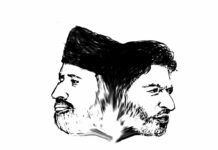MEHRAJ DIN
 As the day of remembering Iqbal nears, preparations are underway to make it a success in the Kashmir university campus. Iqbal being the towering personality of Muslim world always wanted to see Muslims in their highest moral and spiritual standards to which he assigned the title of a complete man (Insan-i-Kamil). His journey into the spiritual and intellectual realm taught us many things which solely discuss the applied challenges of modernity, nation-state, epistemology; materialism, nationalism, and secular anthropology were “high-jacked by the academicians and clerics for limiting his ideas in mosques and podiums.”
As the day of remembering Iqbal nears, preparations are underway to make it a success in the Kashmir university campus. Iqbal being the towering personality of Muslim world always wanted to see Muslims in their highest moral and spiritual standards to which he assigned the title of a complete man (Insan-i-Kamil). His journey into the spiritual and intellectual realm taught us many things which solely discuss the applied challenges of modernity, nation-state, epistemology; materialism, nationalism, and secular anthropology were “high-jacked by the academicians and clerics for limiting his ideas in mosques and podiums.”
His importance lies primarily in his awareness of the problems faced by Islam when confronted with modernity; in particular, the failure of the Muslim world to respond to Western encroachment in the ideological, political and social sphere, but also in the technological and scientific arenas. Iqbal always augmented to understand and interpret Islam in its contemporary context. Having delineated deep into the philosophical challenge posed by western secular philosophies, he traversed and tried to come up with a ray of hope in understanding the challenges posed by the west. Iqbalian philosophy was vibrant with contemporaneous discourse, an intellectual warfare of ideas where rationality and revelation tussle in a common ground, where arguments like the existence of God and Neitzschean claims of God being dead are defined with proofs. His contribution and intellectual caliber can be seen in his “Reconstruction of Religious thought in Islam” which most of our scholars, who have read or interested in Iqbal either skip to read or don’t understand. This whole spectrum of intellectual and spiritual essence is lost somewhere in the shabby clouds of formalism. Nowadays, remembering Iqbal is nothing but chanting the lines of his poetry. It seems that the intellectual dynamism, spiritual message and a critical engagement with different “isms” Iqbal posited is vanished from the hubris of intellectual circles. Ironically, the serious engagement with the thought of Iqbal is missing in academics and the movements who claim to be the forerunners of Iqbal have narrowed down the vast arena of Iqbalian legacy into mere poetic dictum. The need of the hour is to move on to the next stage where scholars engage with a deep intellectual and critical works of Iqbal, and his basic ideas in the field of religion, politics, spirituality, philosophy will be defined in contemporary parlance and not just in chanting his poems. As Iqbal used to say :-
“Dayar Ishq mein apne maqam paida kar
Naya zamana naye subho shaam paida kar”
It is ubiquitously clear that Kashmiri scholars and “intellectual” stalwarts have failed to engage seriously with the vast arena of Iqbalian thought. Our exhaustative and ultra cultural modernization, intellectual corruption, plagiarism, intellectual hooliganism and redundancy is far away from what Iqbal would have expected from the sons of his soil. Sporadically, our formalism has presented bad image in the minds of all those who thought of Iqbal as a torchbearer for Muslims in 21st century. It is the basic responsibility of students and scholars of Islamic thought to understand Iqbal in his contextual paradigm, and his source of inspiration which culminated intellectual calibre. Iqbal refers to his source of inspiration in these words:-
“Tere zameer pe jab tak na ho nuzool e Kitaab
Girah kushaa hai na raze na sahib e kashaaf”
The ideological onslaught from western scholarship has degenerated the whole edifice of Islamic worldview and created stir in the religious and academic circles of Muslim world. Our biggest contribution to our poet, philosopher, and scholar will be to identifying the challenges Muslims are facing on different fronts. There are certain pertinent question needed to be thought and researched upon; what political worldview was propounded by Iqbal? Is Iqbal still relevant to South East Asian political discourse? Was Iqbal successful in understanding western discourse vis-à-vis created an alternative discourse for the people of Asia? The need of the hour is to create a pool of ideological-cum-intellectual influx that dwell deep into these questions and will lead this from passive receptors of different “isms” to the thinking beings and offer an alternate narrative for the Muslim world.
– The author is a doctoral candidate at Shah-i-Hamadan Institute of Islamic Studies, University of Kashmir and can be mailed at [email protected]















